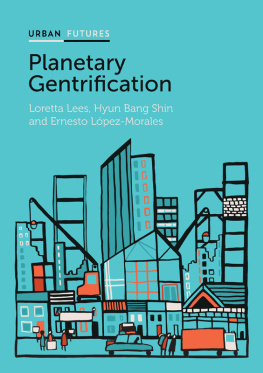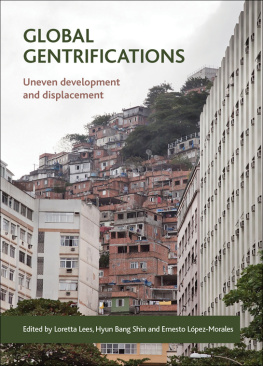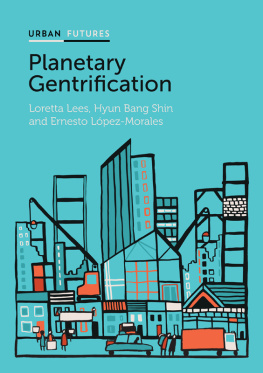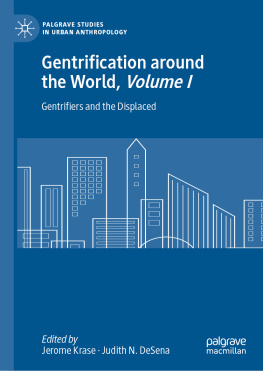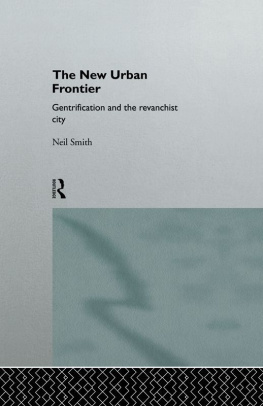
Copyright page
Copyright Loretta Lees, Hyun Bang Shin and Ernesto Lpez-Morales 2016
The right of Loretta Lees, Hyun Bang Shin and Ernesto Lpez-Morales to be identified as Authors of this Work has been asserted in accordance with the UK Copyright, Designs and Patents Act 1988.
First published in 2016 by Polity Press
Polity Press
65 Bridge Street
Cambridge CB2 1UR, UK
Polity Press
350 Main Street
Malden, MA 02148, USA
All rights reserved. Except for the quotation of short passages for the purpose of criticism and review, no part of this publication may be reproduced, stored in a retrieval system, or transmitted, in any form or by any means, electronic, mechanical, photocopying, recording or otherwise, without the prior permission of the publisher.
ISBN-13: 978-0-7456-7164-2 (hardback)
ISBN-13: 978-0-7456-7165-9 (paperback)
A catalogue record for this book is available from the British Library.
Library of Congress Cataloging-in-Publication Data
Lees, Loretta, author
Planetary gentrification / Loretta Lees, Hyun Bang Shin, Ernesto Lpez-Morales.
pages cm. (Urban futures)
Includes bibliographical references and index.
ISBN 978-0-7456-7164-2 (hardcover : alk. paper) ISBN 0-7456-7164-0 (hardcover : alk. paper) ISBN 978-0-7456-7165-9 (pbk. : alk. paper) ISBN 0-7456-7165-9 (pbk. : alk. paper) 1. Gentrification. 2. Urbanization. 3. Urban geography. I. Shin, Hyun Bang, author. II. Lpez Morales, Ernesto, author. III. Title.
HT170.L443 2016
307.2dc23
2015027160
Typeset in 11.5 on 15 pt Adobe Jenson Pro by Toppan Best-set Premedia Limited
Printed and bound in the UK by CPI Group (UK) Ltd, Croydon
The publisher has used its best endeavours to ensure that the URLs for external websites referred to in this book are correct and active at the time of going to press. However, the publisher has no responsibility for the websites and can make no guarantee that a site will remain live or that the content is or will remain appropriate.
Every effort has been made to trace all copyright holders, but if any have been inadvertently overlooked the publisher will be pleased to include any necessary credits in any subsequent reprint or edition.
For further information on Polity, visit our website: politybooks.com
Acknowledgements
Writing this book has been an illuminating experience, as we went through a wide range of both early and recent writings on gentrification and urbanization around the world. The project received a boost from a series of workshops on global gentrifications, which took place in London and Santiago de Chile in March and April 2012 respectively. We would like to thank all the participants in those workshops, and especially Hilda Herzer, who initially participated in this comparative project before she sadly passed away in 2012. The funding from the Urban Studies Foundation and the Urban Studies journal for these events was greatly appreciated. We also thank all those who have kindly provided images other than our own.
Our individual acknowledgements are as follows:
Loretta Lees. I would like to thank David Ley for discussions on global gentrifications on his recent visit to the UK; Jenny Robinson for inspiring my interest in comparative urbanism; Sandra Annunziata for working with me on a Marie Curie project on resistance to gentrification in Southern European cities; my past and current PhD students working on gentrification around the globe. Thanks also to Tom Slater and Elvin Wyly for their continued support. Special thanks to my partner David and daughters Meg and Alice, who had to do without me while I worked on the text for the book; and to Hyun and Ernesto who have been wonderful collaborators and comrades.
Hyun Bang Shin. I would like to thank all the colleagues whose kind invitations to speak on various occasions provided key inspiration for the writing of this book. Particular thanks are to Soo-hyun Kim and Bae-Gyoon Park for their continued interest and support for this work, and to my former and current students for lending their critical ears. The National Research Foundation of Korea Grant funded by the Korean Government (NRF-2014S1A3A2044551) is also acknowledged for its support for part of the works discussed in this book. Special thanks are to Loretta and Ernesto whose solidarity and dedication provided the much needed push for this book. Most of all, I express my deepest love and gratitude to my partner Soo-Jeong for her love and patience while the book was being drafted, and for providing inspiration as always for my research.
Ernesto Lpez-Morales. I would like to thank both the COES Centre for Social Conflict and Cohesion Studies (CONICYT/FONDAP/15130009) and the Contested Cities Project (People Marie Curie Actions Projects, Code: PIRSES-GA- 2012-318944 ), for helping to fund several of the case studies presented in this book. Special thanks to my friends, colleagues and students from the University of Chile who support and intelligently criticize my work. Also appreciation to my encouraging partner Ignacia, my son Martn, and especially co-authors Loretta and Hyun for bringing this collaborative project to its highest level.
Introduction
As readers of the gentrification literature will know, the British sociologist Ruth Glass coined the term gentrification in 1964 in her book London: Aspects of Change:
One by one, many of the working class quarters of London have been invaded by the middle classes upper and lower. Shabby, modest mews and cottages two rooms up and two down have been taken over, when their leases have expired, and have become elegant, expensive residences. Larger Victorian houses, downgraded in an earlier or recent period which were used as lodging houses or were otherwise in multiple occupation have been upgraded once again. Nowadays, many of these houses are being subdivided into costly flats or houselets (in terms of the new real estate snob jargon). The current social status and value of such dwellings are frequently in inverse relation to their status, and in any case enormously inflated by comparison with previous levels in their neighbourhoods. Once this process of gentrification starts in a district it goes on rapidly until all or most of the original working class occupiers are displaced and the social character of the district is changed.
(Glass 1964a: xviiixix, italics added).
Ruth Glass's other writings, however, including those on urbanization outside of Britain are much less well known. For example, that same year she wrote about the Gaps in Knowledge in studies of urbanization in non-Western contexts:
So far, our knowledge of the current processes, configurations and implications of urbanization in the developing countries has been limited, or even apparently arrested, in several interrelated respects. First, the framework of analysis and enquiry in this field (as in many others) has been heavily conditioned by Western, and particularly Anglo-Saxon, experience or rather by categories of thought derived from the as yet inadequately documented, only sketchily compared and partially interpreted, history of nineteenth and early twentieth urbanization in the now industrialized countries, notably Britain and the United States. It is partly because the shock of urbanization felt in these countries during earlier periods is still reverberating, that the notions formed under its impact, whether expressed in terms of reason or unreason, have remained so tenacious and pervasive. The influence of such notions is reflected in the choice of subjects with which students of contemporary urban growth and phenomena in the developing countries have been preoccupied. The predominance of Western thought, in general, is reflected in the treatment of such subjects, which tends to follow both the conventional lines of demarcation between matters urban and rural, and also the established boundaries between the various disciplines of the social sciences.
Next page
